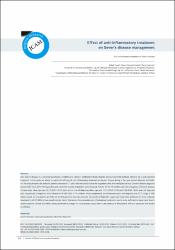Effect of anti-inflammatory treatment on Sever's disease management
Özet
Aim: Sever's disease is a calcaneal apophysitis condition and common childhood problem. Despite various treatment methods, there is not a gold standard treatment. In this study, we aimed to report the efficacy of anti-inflammatory treatment on Sever's disease during a four-year period. Material and Method: The study includes the pediatric patients, between 6-17 years old, who presented to the outpatient clinic with heel pain and had a Sever's disease diagnosis between 2014 and 2017. Demographics and treatment records of patients were reviewed. Results: Of the 74 children who had a diagnosis of Sever's disease, 59 were boys. Mean age was 10.77 (6.87-15.73) years at the time of diagnosis. Mean age was 11.14 (8.04-15.73) and 9.28 (6.87-13.20) years for boys and girls, respectively. Complaints were bilateral in 46 (62.16%) of 74 children. Mean symptomatic period between pain and diagnosis was 12.7 (range 2-108) weeks. Except for one patient, all of the 69 (93.2%) patients' pain was resolved. Two weeks of ibuprofen usage was found to be sufficient for Sever's disease treatment in 68 (91.89%) of our overall patient cohort. Discussion: Non-steroidal anti-inflammatory medication seems to be sufficient to treat most Sever's disease patients. Simple anti-inflammatory treatment is enough for most primary cases; there is no evidence of the positive effect of expensive heel insoles or orthoses.
Cilt
10Sayı
1Bağlantı
https://hdl.handle.net/11363/2022Koleksiyonlar
Aşağıdaki lisans dosyası bu öğe ile ilişkilidir:


















